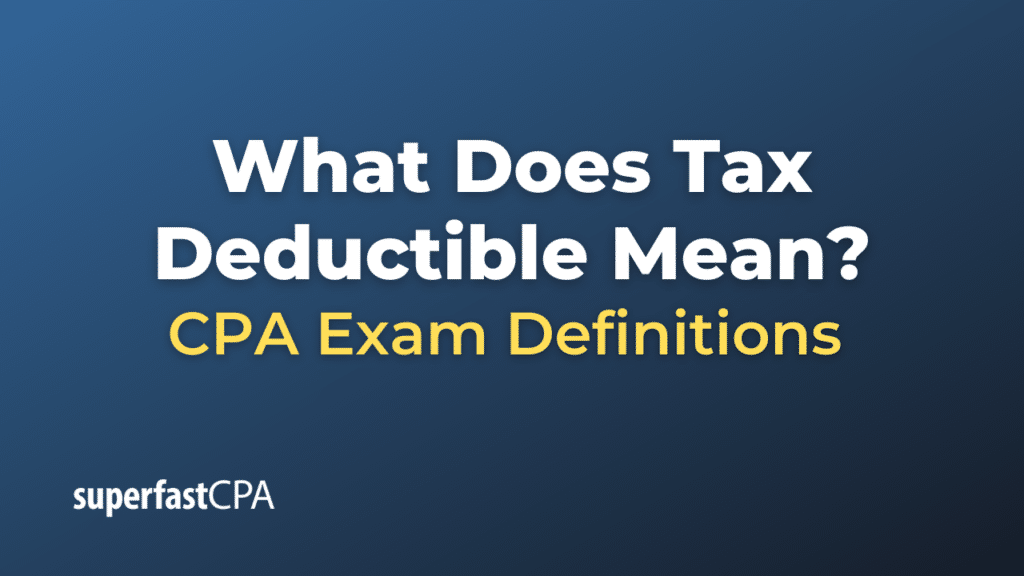Tax Deductible
What Does Tax Deductible Mean?
“Tax deductible” refers to an expense or payment that can be subtracted from a taxpayer’s gross income in order to reduce the total taxable income. When an expense is tax deductible, it effectively decreases the amount of income that is subject to taxation, which in turn reduces the amount of taxes owed.
Here are some key points about tax deductions:
- Purpose: The idea behind tax deductions is to lower the tax liability for certain expenses that the government wants to encourage or recognizes as necessary. This could be due to their positive social impact, their role in fostering business and economic growth, or their alleviation of personal burdens.
- Types of Deductions: Deductions can be either “above-the-line” or “below-the-line”.
- “Above-the-line” deductions (or adjustments to income) are subtracted from gross income to arrive at adjusted gross income (AGI). Examples include contributions to certain retirement accounts, student loan interest, and alimony payments (under pre-2019 divorce agreements).
- “Below-the-line” deductions are subtracted from AGI to determine taxable income. Taxpayers can either itemize these deductions or take the standard deduction, depending on which provides a greater benefit.
- Examples:
- Business expenses : Necessary expenses incurred in the course of earning business or trade income are often deductible.
- Mortgage interest : Interest paid on a home mortgage might be deductible for those who itemize.
- Charitable donations: Donations made to qualifying charitable organizations can be deducted if the taxpayer itemizes.
- Medical and dental expenses: Excessive medical and dental expenses, beyond a certain percentage of a taxpayer’s AGI, can be deducted.
- Limitations: Not all expenses are deductible, and there are often limits or thresholds that apply. It’s essential to consult the tax code or a tax professional to understand which expenses qualify and any associated restrictions.
- Impact: Deductions reduce taxable income, not the tax bill directly. For example, if someone is in a 25% tax bracket and has a $1,000 deduction, this doesn’t mean they’ll pay $1,000 less in taxes. Instead, they’ll pay taxes on $1,000 less income, resulting in a tax savings of $250 (25% of $1,000).
In conclusion, the concept of tax deductibility is a central feature of many tax systems, offering incentives or relief for certain kinds of expenditures. Taxpayers should ensure they understand the available deductions in their jurisdiction to optimize their tax position.
Example of Tax Deductible
Let’s illustrate the concept of “tax deductible” with a hypothetical scenario:
Scenario:
Meet Emily, a freelance web developer. In 2022, she earned $70,000 from various projects. Throughout the year, she had several expenses related to her freelance work:
- Home office expenses: $5,000 (portion of rent, utilities, etc. for her dedicated home office space)
- New computer and software: $2,500
- Travel to client locations: $1,000
- Charitable donations: $1,500 (donated to a qualifying nonprofit organization)
- Medical expenses : $6,000 (but only expenses exceeding 7.5% of her Adjusted Gross Income (AGI) are deductible in this example)
Tax Deductibility Breakdown:
- Business Expenses:
- Charitable Donations:
- Emily’s charitable donations of $1,500 are deductible because she donated to a qualifying organization.
- Medical Expenses:
- In our example, let’s assume Emily can only deduct medical expenses that exceed 7.5% of her AGI. First, let’s find out her AGI: $70,000 (earnings) – $8,500 (business expenses) = $61,500 (AGI).
- 7.5% of $61,500 is $4,612.50. Since Emily had medical expenses of $6,000, she can deduct the amount that exceeds $4,612.50, which is $1,387.50.
Total Deductions:
- Business expenses: $8,500
- Charitable donations: $1,500
- Medical expenses: $1,387.50
- Grand Total: $11,387.50
Taxable Income Calculation: Original Income: $70,000 Total Deductions: – $11,387.50 Taxable Income: $58,612.50
If Emily is in a 25% tax bracket and without any deductions, she would owe $17,500 in taxes (25% of $70,000). However, with her deductions, she’ll owe $14,653.13 (25% of $58,612.50), saving her $2,846.87 due to her tax-deductible expenses.
This example illustrates how tax-deductible expenses can effectively lower a taxpayer’s taxable income and, consequently, the amount of tax they owe.













